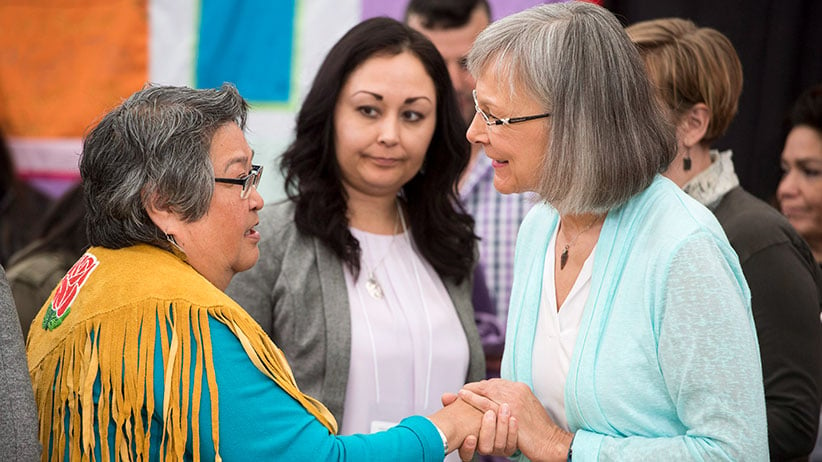How a relative at MMIW copes: fishing, curling and a pet dog
The inquiry’s first witness offers a wrenching look inside the lives of those left behind, and shares the secrets of how she keeps going
Chief Commissioner Marion Buller (right)greets Frances Neumann after she told a story about her murdered sister-in-law Mary Johns at the National Inquiry into Missing and Murdered Indigenous Women and Girls taking place in Whitehorse, Yukon, Tuesday, May 30, 2017. (Jonathan Hayward/CP)
Share

Frances Neumann, the first woman to testify at the National Inquiry into Missing and Murdered Indigenous Women, walks her dog two or three times per day. Her youngest daughter complains of being bumped to the role of middle child, replaced as the baby by Zoey the pet Chihuahua. On a recent shopping trip to Alberta, Neumann paid extra for a hotel to allow Zoey to stay. “She gives me peace,” she says.
The hearings this week in Whitehorse prove the miraculous resilience of families, who each have ways to cope. Neumann’s testimony alone revealed a person whose sister-in-law was suspected to have been murdered by a serial killer, whose brother died; whose infant nephew died; and whose other nephew went to prison. Still, she carries on to testify, hugging other witnesses temple to temple, squeezing her eyelids shut with all her might. The proceedings raise the question not only of how so many Indigenous women have died, but just as unfathomably, how have the family members survived?
“Every fibre in my body is shaken to my roots,” Neumann, 65, said in her testimony. She couldn’t explain how her sister-in-law disappeared in 1975 in Vancouver without mentioning other essential horrors. Neumann’s nephew died of crib death; her brother, of addictions. For six years she searched for her in-law, Mary Smith John, braving conversations at hotels defined by needles and sex work. She realized the effort had been pointless when she found a newspaper article suggesting that Smith John had been in the company of Gilbert Paul Jordan, who had poisoned women by paying them to binge drink—“$20, $50, $75 to drink more,” says Neumann, who was then forced to break the news to her teenage nephew, who was in prison.
While Neumann testified, her dog was home with her husband, who is 75 years old and still does judo. The couple met when Neumann was 19 and they both worked in a residential school. He was non-Indigenous and from Ottawa, and they moved to Vancouver where he worked as a respiratory therapist, and where Neumann began searching for Smith John. The mission took her to “places nobody should ever go.”
Between the days spent looking through the Downtown Eastside, Neumann took solace in curling. She has since torn ligaments in both knees so can no longer “go down into the squat.” But she can still go fishing for 16 hours at a time—alone, preferably off the Carcross/Tagish bridge in the Yukon. She brings a cooler full of food, usually fruit salad.
After moving permanently back to the Yukon in 2002, she settled in Whitehorse. She worked as a custodian in a hospital, and now does the same job in a high school, where she often shoos students back to class. Her son works as a machine operator for a Yukon railway. Her daughter, who also testified Tuesday, works for the Yukon Department of Education. Six of Neumann’s eight siblings have died.
With her niece, Neumann pulls all-nighters playing cards—”we are mad Canasta players”—and they snack on BLTs or tuna melts, until morning rolls around and it’s time for bacon and eggs. With inquiry proceedings underway until Thursday, Neumann is too busy just now for games or fishing in Carcross. “But definitely next weekend I will be on the bridge.”